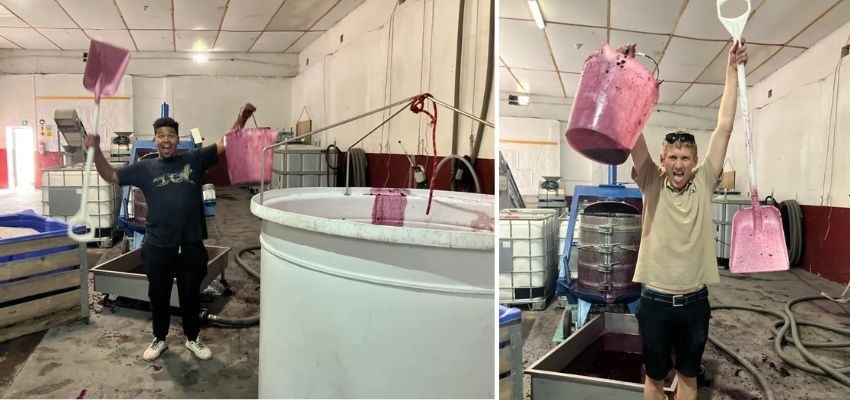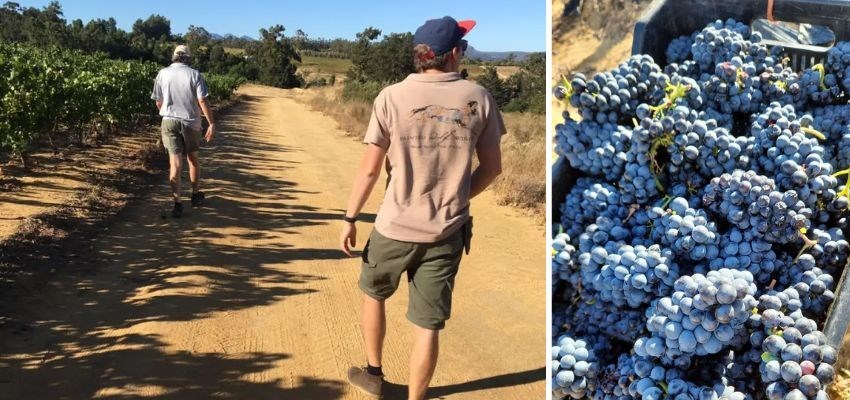
The Painted Wolf Wines harvest kicked off early this year. With our first grapes, Pinotage coming into the cellar on 23 January a full week earlier than last year. We had several weeks of intense harvest activity followed by a lull and eventually some grapes later in the season.As usual we sourced grapes from growers in several locations.
We finally wrapped up the 2024 harvest on 9 April, pressing off the last tank of grapes, a batch of beautiful Elgin Syrah. It was the culmination of a fun, intense and at times challenging 10 weeks.
Harvest kicked off early this year. With our first grapes, Pinotage coming into the cellar on 23 January a full week earlier than last year. We had several weeks of intense harvest activity followed by a lull and eventually some grapes later in the season. As usual we sourced grapes from growers in several locations.
Welgugund Farm, Wellington
An extremely wet winter on Welgugund followed by a warm spring resulted in early and abundant flowering with great bunches set. This was followed by a long dry spell leading up to a warm December with hot spikes. It was also very windy during December. The effect of these dry conditions and the wind was a considerable reduction of most of the crop on Welgugund.
The first grapes we harvested were Pinotage off a hillside block, on 23 January. We were staggered to see how extraordinarily ripe, dark, and powerful the fruit was. The dry conditions promoted extremely small grapes ad bunches, and wind damaged thinned the crop out on various sections of the vineyard, We harvested selectively to avoid wine damaged sections of the vineyard. We had planned for 10 tons of grapes from our rows, but there were only 5 tons available. The new wine is staggeringly delicious, if rather unfashionably high alcohol.
Next off was Grenache, on 26 January. This has to be the earlies harvest date, ever. The crop was also down, but the quality exciting. We opted to whole bunch ferment. In two 1500-liter open tanks. This involves tipping grapes straight from the picking bins into the fermenter and once a few hundred kgs of grapes are in the tank, one of the chaps in the cellar jumps in with his gum boots and foot stomps the grapes to break up some of the bunches. A further few hundred kgs are added and the same procedure followed till the tank is full. We use a commercial “Rhône style” yeast when we whole bunch ferment.
The process takes a great deal longer them fermenting crushed grapes and we eventually emptied the tanks and pressed the new wine four weeks after harvest. The 2024 Lycaon Grenache is looking excellent.
We normally buy Carignan from Welgugund, but there were no grapes available as the vineyard was badly wind damaged.
The beautiful heritage Chenin vineyard on Welgugund is in the base of an old water course, a wet land, and more sheltered from the wine, so we got out 6 tons of grapes.
We opted t harvest over 2 days =, 6 February and 12 February. The early harvested portion has great clarity and freshness and the later portion a bit more texture and richer fruit. We processed the grapes very slowly in our half ton small press. It took around 14 hours to process each batch of 3 tons of grapes.
Fermentation was with wild yeast and took place in a mixture of flex cube, clay amphora and old barrels. I’m excited by the prospect of this wine, Lycaon Chenin 2024

Kasteelsig, Swartland
Conditions here were more benign than in Wellington. The soil is different, being shales which hold water well, and the wind is normally less severe.
The crop at Kasteelsig was up on last year, but also harvested early after the long dry warm spring.
We harvested Syrah on 8 February. Once again, we used wild yeast and fermented in small open bins. The larger than average crop led to us being offered a second batch of the same organic grapes on 20 February. We opted to whole bunch ferment a portion of these grapes. The new wine is dense and firm despite having lower than usual alcohol.
Mourvedre also came into the cellar on 20 February. The quality is outstanding, we destalked and fermented in small bins with natural wild yeast. The new wine if dense and dark.